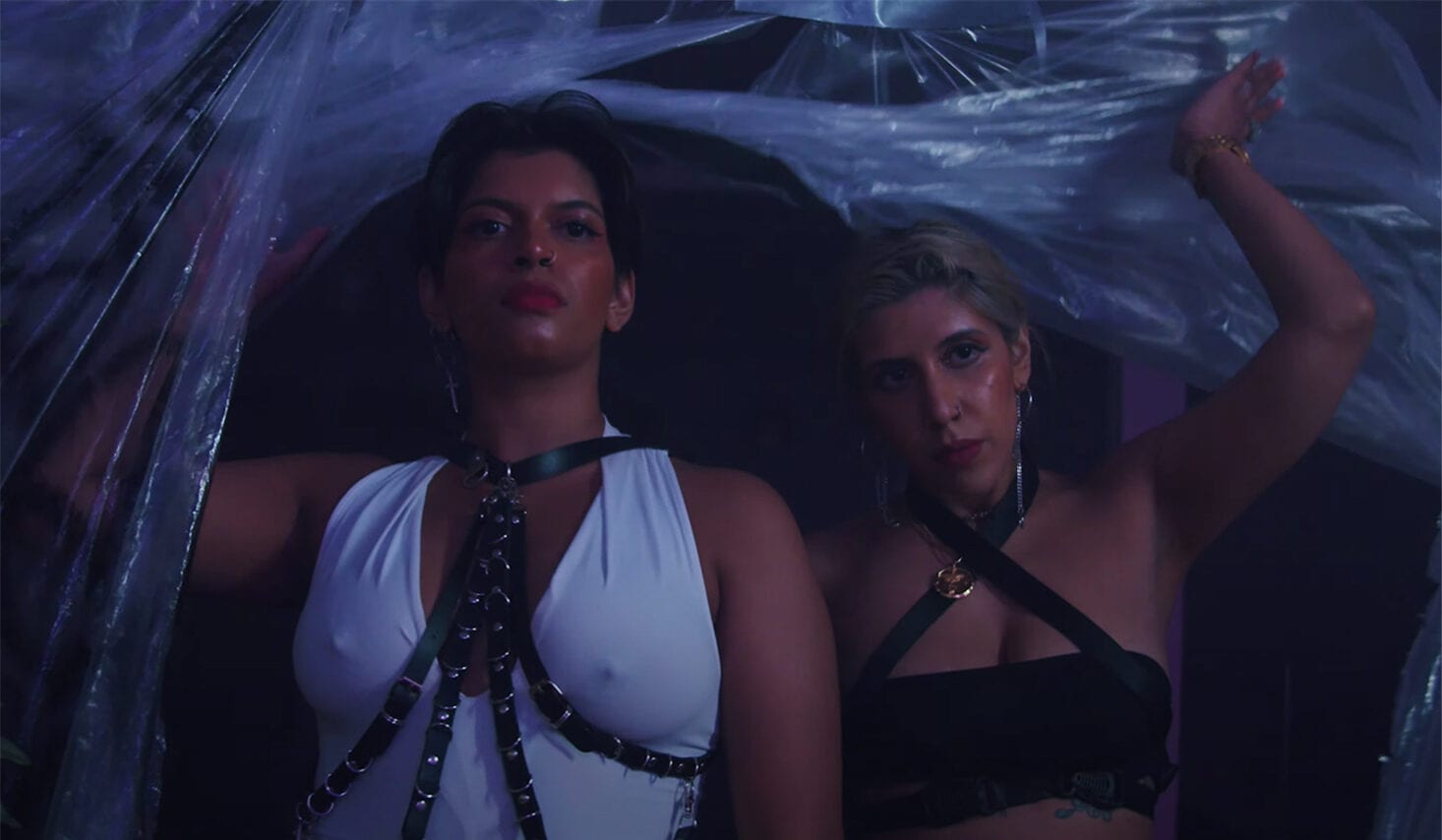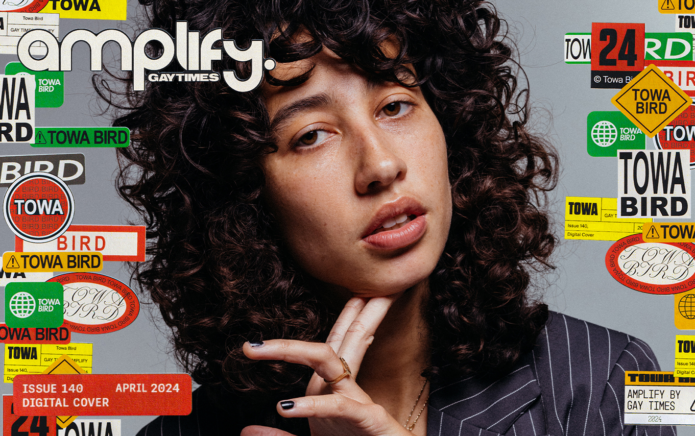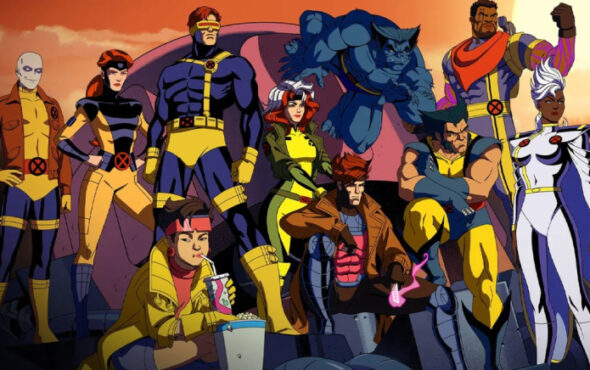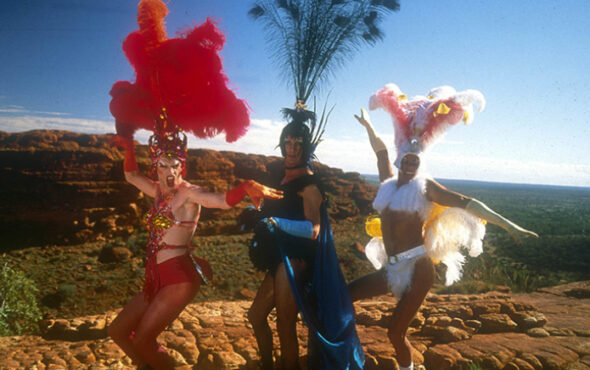
When I first heard Eboshi and Contra spitting rhymes to some seriously addictive beats my thoughts were “who the fuck are these badass bitches, I need to talk to them!” Their latest track Drift – out today – has them looking banging while smoking truckloads of ganja.
“Drift is about BIPOC women enjoying themselves and the fruits of their labor,” they said of the track. “In our music video we wanted to show a beautiful group of creatives and artists from various backgrounds dabbling in marijuana. We also wanted to show a group of women owning the means of production. Lyrically, this song exists in the Cartel Madras Universe and follows us doing what we do best; self-referentially discussing high powered, risky, good times. Drift opens 2021 for Cartel with new energy, big vibes, and ganja fuelled heat.”
Eboshi is just at the tail-end of an all-nighter in her hometown of Toronto and her actual real life sister and other half of Cartel Madras, Contra (who is based in Calgary) was unavailable for the interview due to a family emergency. It’s 9am in Toronto and 2pm for me in London and we both settle down to our Zoom in our living rooms and snuggly dressing gowns, matchy-matchy style.
Your music is fire, it’s powerful and confident. Were you always like that?
Our musical personality is a perfect reflection of who we are and that’s hard for some people to accept as a valid identity moving forward in the world. It comes from a strong sense of self and how we feel.
Where does the sense of self comes from?
Thinking, reading, processing, being huge nerds to find the shit you resonate with.
As musicians, nerd-ship feels like a prerequisite for us right?
Yeah!
What were you like as kids?
So similar! And in so many ways in terms of creating music and writing about our experiences, raw and unfiltered. And now we’re writing out our perspectives and it still rings true but we have more tools to articulate it with now, not just writing but by pairing it with music and visuals.
When I started out as a singer, writer and spoken word artist 20 years ago, I couldn’t find producers that could recreate the sounds in my head. Now so much has changed. I’ve just finished producing a track with another Toronto based queer Asian female producer and it’s like, yes finally! You get me! What’s changed for you as you were touring before the pandemic…
We’ve had to adapt massively. We used to pass a bottle of gin around our gigs and our shows were pretty wild. A crazy, wild night and lots of stupid shit. When the tour had to be cancelled, we focused on videos and moving our craft forward.
It’s actually so incredibly rare to meet other South Asian women in music. Think of how many you can think of. MIA, Anoushka Shankar… who else? So on this realisation I’ve looked back at when I started out and realised how I was so disillusioned by this industry and had to underplay so many parts of my identity; my queerness, my masculinity, my ethnicity. We haven’t had a movement. I see a lot of Asian guys, but much fewer women. What was it like for you? Did anyone inspire you?
That question is so important. There is currently this huge explosion of representation in music and it’s brilliant to see. But it feels like it skipped a generation. I remember seeing the rise of MIA and my sister and I just watching in awe and absolute inspiration and the assumption was that South Asian women had at the time had was that this was about to open the floodgates. Yeah this is about to happen now. We waited and it was nothing and no-one. Where did the momentum go? There was supposed to be a line-up of South Asian women as part of this wave doing things in their own way. MIA was very outspoken and different and now there was supposed to be room for the variety of spice girls that could emerge in South Asian female artistry. I feel like there was this time, a really significant amount of time with niche artists doing their thing in the UK, or in North India where artists and rappers were starting to fuel what would become ‘the gully gang moment’ and a community in LA and in NYC, they were all pockets of South Asian artistry.
As these things were bubbling up, our generation, like my sister and I, this generation of musicians were just tired of waiting and so impatient in waiting to see what were supposed to be the people that could speak to us on our screens and in our iPods. At least for us the project of being who we are and representing our identities authentically and accurately is extremely important for us, but I would say that our inspiration for what drives us forward is just the sounds. There is a representative piece of what we do that is unavoidable. At the end of the day we’re rappers that vibe off the quality of our bars and that’s what matters most. We’ve waited and we can’t wait anymore.
I’m the generation of South Asian women that got skipped back then right. So when Amy’s Back to Black came out, every label wanted their Amy. For a time everyone sounded like Amy. So why didn’t that happen with MIA?
I think there are a few things; MIA was extremely controversial and political for that time. Now, you’re expected to be an advocate for your causes and using your platform, but back then they couldn’t handle her. Even the Tamils in Sri Lanka didn’t want the eyes on them that she was bringing. The timeline after MIA was really dictated by her pushing the envelope and the sensibilities of being a mainstream artist at that time.
Especially with the things she was talking about.
And also making huge miscalculations with what they’re talking about.
Plus the flack for not bringing other artists up with her.
The obligation artists have are very new. ‘There’s only one of you’ is the label mentality.
She was having a hard enough time to be in her space and the community aspect of bringing people with you wasn’t what it is now.
As diaspora, it’s a long road to having a sense of self and taking pride in your culture rather than romanticising it. Someone messaged us and told us to’ stop smoking weed and turn to Jesus’.
The Uncles are everywhere.
Yes there’s so much entitlement like ‘I wanna see you in these colours at these times or I’m not gonna be your fan anymore’. Or ‘very cute pic but have you thought about growing your hair’.
‘I feel a connection to you and I want you to meet me for coffee. Why don’t you reply. Why won’t you meet me?!! You’re so mean waaaaah!’ Or ‘don’t show your body, it is private’. Nah dude, IT’S MINE so have fun looking at it or fuck off.
The entitlement to your body and space as an artist is weird, especially as women.
What’s next?
In 2020 we were of course so disappointed to have the tour cancelled, but luckily we were able to work on our upcoming project and make music videos, including Drift. We got to focus on our artistry which we wouldn’t have had if we’d been touring. We were like ‘Oh no, we aren’t going to perform at Pop Culture Berlin’ but they made it into a festival and commissioned videos. So we kept it moving and had to find a different way of working and change gears. We want to get another EP out before the full length album. So people understand the mythology and lore that will be part of the full length album.
Our government told artists to go get other jobs. I’m hella glad you kept going and I’ve found you and we get to hang out now.
It’s so dope to meet you. We were like ‘Reeta reached out, what!” We’re huge fans and were like “shut up”!
Well let’s hang out and fan girl each other again soon!
Drift is Cartel Madras’s first new music of 2021, and is from their forthcoming project The Serpent and The Tiger, the third installment of the Project Goonda trilogy (which includes 2018’s Trapistan and 2019’s Age of the Goonda) due out later this year on Royal Mountain Records/Sub Pop.



